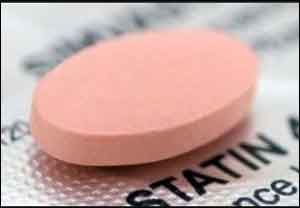- Home
- Editorial
- News
- Practice Guidelines
- Anesthesiology Guidelines
- Cancer Guidelines
- Cardiac Sciences Guidelines
- Critical Care Guidelines
- Dentistry Guidelines
- Dermatology Guidelines
- Diabetes and Endo Guidelines
- Diagnostics Guidelines
- ENT Guidelines
- Featured Practice Guidelines
- Gastroenterology Guidelines
- Geriatrics Guidelines
- Medicine Guidelines
- Nephrology Guidelines
- Neurosciences Guidelines
- Obs and Gynae Guidelines
- Ophthalmology Guidelines
- Orthopaedics Guidelines
- Paediatrics Guidelines
- Psychiatry Guidelines
- Pulmonology Guidelines
- Radiology Guidelines
- Surgery Guidelines
- Urology Guidelines
Men using Statin at higher risk of gynecomastia

Canada: People using statins (HMG-CoA reductase inhibitors) are at increased risk of developing gynecomastia -- swollen male breast tissue due to hormonal imbalance, according to a new study published in the journal Clinical Endocrinology.
Gynecomastia is the benign proliferation of the glandular breast tissue in men. It is characterized by subareolar breast enlargement and occurs due to an imbalance in the actions of oestrogen and testosterone on breast tissue. It can create a psychological burden due to embarrassment, physical discomfort and a fear of breast cancer.
Also Read: Lavender and Tea Tree Oil may predispose to Gynecomastia
Previous case reports have suggested an association between HMG-CoA reductase inhibitors (ie, statins) and increased gynecomastia risk. Also, a recent meta-analysis found that statins decrease the levels of circulating testosterone in men.
New cases of gynecomastia requiring at least two ICD-9 codes were identified from the cohort and matched to 10 controls by follow-up time and age using density-based sampling. Rate ratios (RRs) for users of statins were computed using conditional logistic regression adjusting for alcoholic cirrhosis, hyperthyroidism, testicular cancer, Klinefelter syndrome, obesity, hypogonadism, hyperprolactinemia and use of spironolactone, ketoconazole, H2 receptor antagonists (H2 blockers), risperidone, testosterone, and androgen deprivation therapy.
Key Findings:
- More cases than controls had one of the conditions or medications associated with gynecomastia.
- The adjusted RR was 1.19 for statin use 0–30 days prior to the index date, 1.38 for statin use 31–60 days prior to the index date and 1.20 for 61–365 days prior to the index date.
- The RR for current use of finasteride was 3.42 (95% CI: 2.36–4.94).
- The RR was similar for recent use and past use of finasteride.
Based on the results, the authors concluded that statin use is associated with an increased risk of developing gynecomastia. Clinicians should be cognizant of this effect and educate patients accordingly.
For further reference follow the link: https://doi.org/10.1111/cen.13794

Disclaimer: This site is primarily intended for healthcare professionals. Any content/information on this website does not replace the advice of medical and/or health professionals and should not be construed as medical/diagnostic advice/endorsement or prescription. Use of this site is subject to our terms of use, privacy policy, advertisement policy. © 2020 Minerva Medical Treatment Pvt Ltd